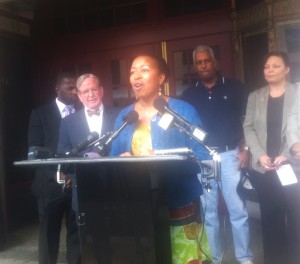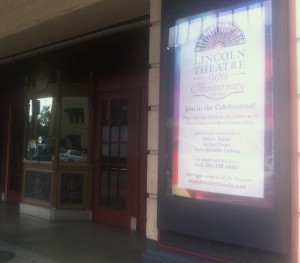D.C. May Lose One of the Last Remnants of Black Broadway

Elahe Izadi / DCentric
Cynthia Robbins, Lincoln Theatre board member, makes an appeal for funding to save the theater.
When the Lincoln Theatre opened in 1922 on U Street, it was one of the jewels of “Black Broadway.” But with money running out, the historical landmark is at risk of closing.
“They say, ‘Before Harlem, there was U Street,’” said Rahim Muhammad, who grew up in the area. “So to me, the Lincoln is more important than the Apollo.”
During a Thursday afternoon press conference in front of Lincoln Theatre, board members blasted Mayor Vincent Gray for not answering their calls to hold a meeting to discuss saving the theater. Gray has said the theater’s business model is “not sustainable” and that the city couldn’t “pour money” in it.
Without a $500,000 boost, board members said the theater could close by the end of the year.
The possible closure of the Lincoln Theatre may be a sign of bad economic times. But some say the theater, on a now totally-gentrified corridor, holds a special place in D.C.’s black history and it should be preserved.
Rick Lee, a Lincoln Theatre Board member, criticized the city for giving money to other theaters such as Ford and Arena Stage, and yet failing to allocate anything to the Lincoln Theatre in Fiscal 2012, which begins Oct. 1. They have received $250,000 in past years.
“Even though the mayor is black, I almost feel like it’s a racial thing because I don’t see why you would have this theater, as beautiful as it is with all of this potential, and nickel and dime it,” Lee said. “I’m offended.”

Elahe Izadi / DCentric
The Lincoln Theatre was supposed to celebrate its 90th anniversary next year. It may close before that due to lack of funding.
The demographics of the area have changed since the theater’s heyday — most nearby residents are white — but board members don’t view that as a problem.
“[The theater] has evolved. We have diversified our programming,” said Lee, who has also owned Lee’s Flower and Card Shop on 11th and U for more than five decades. “We don’t have a problem with the neighborhood changing. It was an African American institution and I still think it should be preserved as a monument to the African American struggle.”
The theater does host a variety of shows. For instance, an Indian dance company has a performance scheduled next week. But the theater does need to attract more programming to survive, some critics say.
Muhammad, who has also produced a number of shows at the Lincoln Theatre, said the black community should do more to support the institution.
“I think all the real cultural history of the greater U Street area is being lost, and I think especially the African American community has abandoned U Street,” Muhammad said. “There are large African American organizations that could help the Lincoln.”
Muhammad questioned why big groups, such as BET and the Urban League, don’t host galas and events at the Lincoln Theatre rather than at venues downtown.
DCentric has a call into the mayor’s office and will update this post once we have a response.
-
http://twitter.com/DCDan DC Dan
-
http://pulse.yahoo.com/_P7XW7N5RYOJI33HHPL65GSPE5Q K
-
http://notionscapital.com Mike Licht
-
http://notionscapital.com Mike Licht
-
esthermiriam
-
Anonymous






